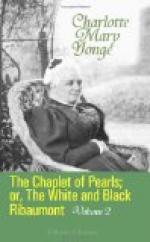Follet made his advances, but with a coquettish eye and look, as if ready to start away at any moment.
’Soh, Follet. I have no bread for thee, only two apples; but, Follet, listen. There’s my beau-pere the Count, and the Chevalier, all spite, and their whole troop of savage gens d’armes, come out to fall upon the poor Huguenots, who are doing no harm at all, only listening to a long dull sermon. And I am much afraid my father is there, for he went out his hawk on his wrist, and he never does take Ysonde for any real sport, as thou and I would do, Follet. He says it is all vanity of vanities. But thou know’st, if they caught him at the preche they would call it heresy and treason, and all sorts of horrors, and any way they would fall like demons on the poor Huguenots, Jacques and all— thine own Jacques, Follet. Come, be a loyal pony, Follet. Be at least as good as Eustacie.’
Follet was evidently attentive to this peroration, turning round his ear in a sensible attitude, and advancing his nose to the apples. As Beranger held them out to him, the other boy clutched his shaggy forelock so effectually that the start back did not shake him off, and the next moment Beranger was on his back.
‘And I, Monsieur, what shall I do?’
’Thou, Landry? I know. Speed like a hare, lock the avenue gate, and hide the key. That will delay them a long time. Off now, Follet.’
Beranger and Follet understood one another far too well to care about such trifles as saddle and bridle, and off they went through green grassy balks dividing the fields, or across the stubble, till, about three miles from the castle, they came to a narrow valley, dipping so suddenly between the hills that it could hardly have been suspected by one unaware of its locality, and the sides were dotted with copsewood, which entirely hid the bottom. Beranger guided his pony to a winding path that led down the steep side of the valley, already hearing the cadence of a loud, chanting voice, throwing out its sounds over the assembly, whence arose assenting hums over an undercurrent of sobs, as though the excitable French assembly were strongly affected.
The thicket was so close that Beranger was almost among the congregation before he could see more than a passing glimpse of a sea of heads. Stout, ruddy, Norman peasants, and high white-capped women, mingled with a few soberly-clad townsfolk, almost all with the grave, steadfast cast of countenance imparted by unresisted persecution, stood gathered round the green mound that served as a natural pulpit for a Calvinist minister, who more the dress of a burgher, but entirely black. To Beranger’s despair, he was in the act of inviting his hearers to join with him in singing one of Marot’s psalms; and the boy, eager to lose not a moment, grasped the skirt of the outermost of the crowd. The man, an absorbed-looking stranger, merely said, ‘Importune me not, child.’




